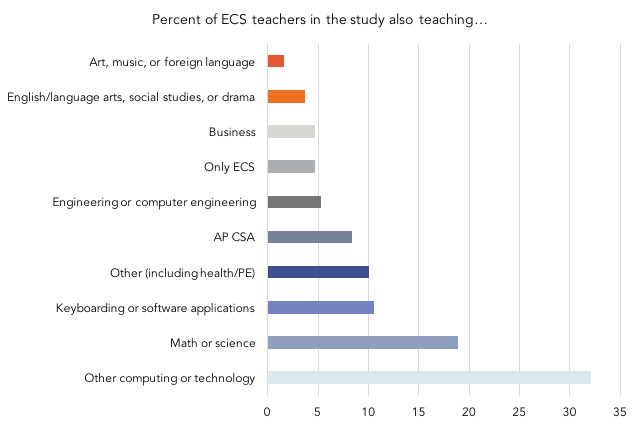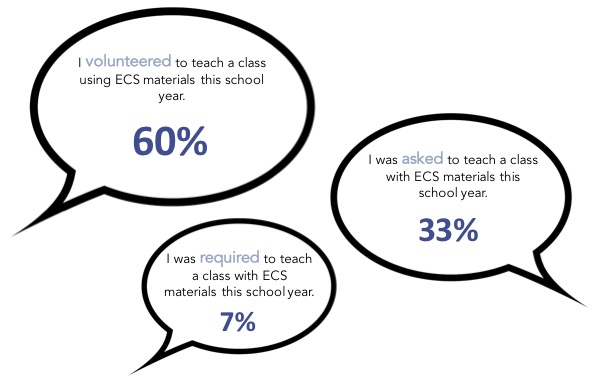One simple question the BASICS study can help answer for the K-12 computer science (CS) education community relates to who is currently teaching introductory high school CS with the Exploring Computer Science (ECS) curriculum. The field is engaged in unprecedented efforts to expand opportunities in K-12 CS education, and with that expansion comes the need for CS teachers. Yet readily accessible information about the current national landscape of the high school CS teaching population, including ECS teachers, is lacking.
In 2013, we conducted a collaborative landscape study to establish a more comprehensive understanding of the nation’s high school CS teaching population at the time and the contexts in which they taught. Several years later, we want to know more about introductory CS teachers specifically—what are their backgrounds, education and training, experiences with teaching, and reasons for teaching with ECS?
This information is important not only to the BASICS research as it relates to the supports for and barriers to implementing introductory CS (the “influential factors”), but also to district and school leaders looking for teachers who can teach high school CS, curriculum developers and teacher training organizations working to construct appropriate teacher professional development as CS course offerings grow, and the CS education community in general seeking to understand components of the current CS teacher landscape.
The data below show information about teachers that teach with ECS who responded to an online questionnaire administered by the BASICS team in the spring of 2015. High school teachers using ECS in five regions across the country (Broward County, FL; Chicago, IL; Los Angeles, CA; New York City, NY; and Washington, D.C.) were invited to participate. In total, 130 teachers provided usable data.
National* and district** data are provided, where available, to contextualize the BASICS findings.
We define factors as contexts and conditions external to the innovation itself that can influence implementation, either by supporting or inhibiting it. These include characteristics of the innovation itself, individual users, the organization(s), and the environment. Examples of factors measured in the BASICS study include factors related to teaching in general (e.g. resourcefulness and coping, innovativeness), factors related to teaching CS in general (e.g. sense of efficacy in teaching CS, attitude towards ECS), factors related to teaching with ECS (e.g. understanding the innovation, intrinsic and extrinsic motivation), and factors related to descriptive characteristics of teachers (e.g. education, experience).

If responses are representative of teachers using ECS in the study area classrooms, this is in contrast with the trend among high school teachers of all subject areas nationwide, which shows that there are more female teachers than male teachers across the U.S.

A smaller proportion of BASICS ECS study teachers identified as white than teachers of all subject areas in the national high school teaching population. To help contextualize the study sample, available racial/ethnic identity data for all subject teachers (of all grades) in the major school districts in each region are also provided here.
Teacher Diversity Racial/ethnic teacher diversity has important implications for student achievement: research has found that having more teachers of color in classrooms provides role models for students, builds social trust, and can help narrow the achievement gap. The following resources provide more information about this issue:
Time for a Change: Diversity in Teaching Revisited (National Education Association, 2014)
Teacher Diversity Revisited: A New State-by-State Analysis (Center for American Progress, 2014)
Major Teacher Diversity Problems in U.S. Schools (U.S. New & World Report, 2016)
The State of Teacher Diversity in American Education (Albert Shanker Institute, 2015)

There were fewer teachers in the BASICS sample under 30 years, and slightly more in the 50 – 60 years range; however, there were teachers of all ages teaching introductory CS with ECS.
Teacher shortages As computer science (CS) education initiatives continue to expand, there is concern about a shortage of prepared CS teachers. This issue of a lack of teachers is not unique to computer science; in fact, a number of reports focused on the issue of teacher shortages nationally have recently been released. The following resources discuss the problem and potential strategies to address it that are relevant to both the CS community and educators at large.
Teacher Shortages: What We Know (Education Commission of the States, 2016)
Teachers in our sample had a similar range of experience to high school teachers nationwide.
Total years teaching (any subject area):



Over 40% of the BASICS ECS study teachers also taught computing courses beyond introductory CS with ECS (AP CSA or other computing or technology), while almost 25% taught mathematics, science, and/or engineering alongside their ECS course.

Of those, only about one quarter majored in Computer Science.
Almost three-quarters of the teachers indicated taking at least one college-level CS course; of those teachers, 37% completed 1-2 courses while 23% completed 10 or more courses. Over half of the study teachers reported holding a CS certification or endorsement. In interviews, some teachers reported that they had experience working in industry prior to their teaching careers, while others were very new to the field.


Credentialing requirements for high school CS teachers vary by state. For definitions of certification, license, endorsement, and authorization, as well as information on specific state requirements or offerings, take a look at the Leadcs.org tool, “Teacher Credentialing for High School CS: Certification, Licensure, and Endorsement.”

Almost all of the teachers who took the questionnaire were teaching ECS voluntarily—some offered to teach it or even brought the curriculum to their school, while others were asked by school leadership and agreed to teach the course. Less than 10% reported that they were only teaching ECS because they were required.
*National data is from the 2011-2012 school year. Source: http://nces.ed.gov/programs/digest/d13/tables/dt13_209.50.asp
**District data sources:
Suggested Citation: Outlier Research & Evaluation (2016). Who is Teaching Introductory Computer Science with ECS? Findings from the BASICS Study. Retrieved from http://outlier.uchicago.edu/basics/findings/ECSTeachers/